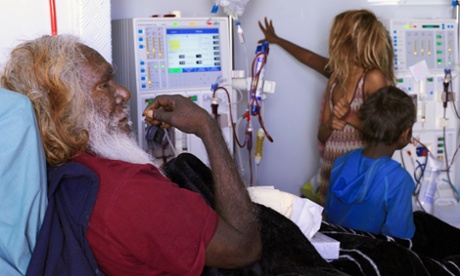Cancer Council NSW report also says Aboriginal men are 13% less likely to have surgery for cancer than non-Aboriginal men

Aboriginal men are 50% more likely to die from prostate cancer than other Australian men, research has found, despite the age of diagnosis and spread of disease being similar for both groups.
In the largest ever study of the disease in Aboriginal men, Cancer Council NSW researchers analysed registry records for all men diagnosed with prostate cancer in the state between 2001 and 2007.
They found as well as dying from the disease at higher rates, Aboriginal men were 13% less likely to have surgery for their cancer than non-Aboriginal men, and 15% less likely to have surgery if their cancer had spread.
Mortality five years after diagnosis was also higher for Aboriginal men – 17.5% versus 11.4%, the research, published in the British Journal of Neurology International, found.
An author of the paper, Associate Professor David Smith, said researchers were unable to pinpoint why Aboriginal men were more likely to die.
“It is likely though that those men who experience progression or recurrence of the cancer after initial, localised, disease, fall through the gaps along the way and are either not referred on for radiation or hormonal treatment, or choose not to take up those referrals,” he said.
“And this is not just a rural issue, where issues like distance from and accessibility to health services could be an issue. Most of the Aboriginal men in our study were in urban areas.”
Smith said it was likely there was an element of distrust among Aboriginal men toward health professionals, possibly driven by negative experiences.
“Some may mistrust the system as it’s not set up for them in a way that they can interact with and understand,” Smith said. “So we know cultural issues and understanding are one of our big challenges in communicating with Aboriginal men, and we’re calling for health professionals to be aware of this and understand it could be a hindrance to their patients getting the best possible care.”
A general surgeon in Darwin, Associate Professor Phillip Carson, has a special interest in breaking down cultural barriers. He says ensuring Aboriginal patients have access to interpreters so they can understand their diagnosis and the importance of follow-up is an “ongoing battle” in the Northern Territory.
“In all of our cancers in the territory, Aboriginal people tend to do worse,” Carson said. “For example, the incidence of breast cancer is much lower in Aboriginal women than in the general population, yet they are much more likely to die from it.
“There are many reasons for this, including distance and language barriers, and a lack of trust in and understanding of the medical approaches we take because they are not explained properly.”
He said he had struggled to get government funding for interpreters for Aboriginal people, and that he continues to have to justify their importance.
“We had interpreters for Greek patients, for Chinese patients, long before we were given interpreters for Aboriginal ones, and even now we have them we have to keep fighting to keep their importance at the forefront,” Carson said.
“The problem is the health departments don’t see it as their core business, even though legal cases have shown patients are greatly disadvantaged without interpreter access.”
An Aboriginal liaison officer with Nepean hospital in NSW, Jim Lord, says some Aboriginal men have no idea what getting screened for prostate cancer involves, and that it only requires a blood test. He agrees that stronger communication to Aboriginal men is needed to bridge this gap, and that there is a dire need for more Aboriginal health workers.
“Perhaps some Aboriginal men also feel they don’t want to be told what to do by doctors because of a feeling that other people are in control of all aspects of their lives,” he said.
